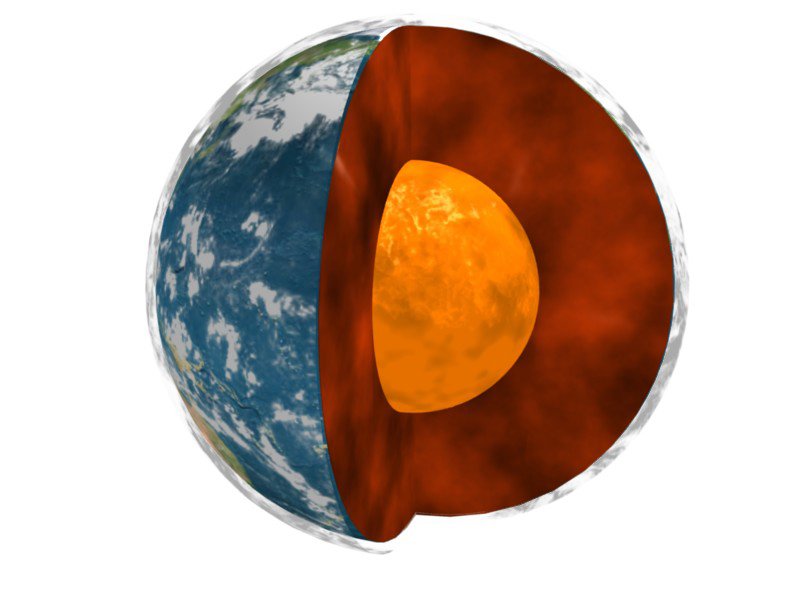What you’ll learn:
How Earth’s rotation, or spin, creates a habitable life for us.
Key takeaways:
If Earth stopped spinning (or rotating) our lives would be extinct.
Earth’s rotation plays a huge role in our lives. We often take Earth’s rotation, or spin, for granted because we have never lived in a world that isn’t spinning. So, what would happen if Earth stopped spinning? Let’s take a closer look at some of things we would see if an invisible hand somehow managed to stop Earth’s rotation in an instant.
Our Earth rotates once every day, from East to West, or in the counter clockwise direction if we were to look down from the North pole. We often think of a day as 24 hours, but this isn’t quite right. It actually completes one full rotation every 23 hours 56 minutes 4.09053 seconds (yes, we know this quite accurately).
We can use the time it takes to rotate once as well as the distance a person on the surface goes through in that time to discover Earth’s rotational speed. That is, we can find out how fast we are spinning in space as we sit and drink a hot cocoa.
This rotational speed will change dependingon just where you are drinking that hot cocoa, why? Because someone on the equator is traveling more than 24,000 miles in a day while someone researching at in the Antarctic, near the South pole, is traveling a far smaller distance.
Let’s pretend we all meet up for hot cocoa on the equator just before this invisible hand comes down and stops Earth from spinning. In this case we would be travelling 24,901.451 miles per 23.94 hours. Velocity is distance covered per unit time, so 24,901.451mi/23.94hrs is just about how fast we are hurtling through space due to Earth’s spin. We also have a speed going through space necause of Earth’s revolution around the Sun, but we are talking about what would happen if Earth stopped spinning, so in our thought experiment it would still revolve around the sun.
This speed works out to be just about 1000 miles per hour, and since that is a nice number we are going to use it. So, if Earth stopped spinning we would suddenly go from moving at 1000mph on the surface of Earth, happily sipping cocoa, to instantle hurtling 1000mph over the surface of the Earth.
Why would we keep moving? Newton’s first law states that an object in motion stays in motion unless an external force acts upon it. This is a great law for our daily lives, especially when it comes to Earth’s spin. Since there is no friction in space, friction is not slowing down Earth’s spin, and we keep having days and nights just as we have for eons.
If we are going to get particular, we are technically slowing down, but it is incredibly slow. The force that is causeing Earth’s rotation to slow down is due to our oceans, and our tidal locking with the moon.
But for the most part, Earth is just doing it’s thing. Now, if an invisible hand comes down and forces Earth to stop spinning we have an external force on the Earth, but not on us, or anything else.
Why does that matter? If we don’t have an external force acting on us we keep on moving through space at 1000mph, and that is no bueno.
Let’s take a look at some things that would happen if Earth stopped spinning.
Invalid shortcode parameters
What would happen if Earth stopped spinning?
- We would be propelled from Earth at a speed of 1000 miles per hour.
- The oceans would continue moving at 1000 miles per hour and create a massive tsunami.
- We would be faced with supersonic wind moving at (you guessed it) 1000 miles per hour.
- The mantle and core would be ripped apart as the core continued to spin.
- The oceans would pool at the North and South poles.
- One day would now last the same amount of time as one year.
- Earth’s magnetic field would be gradually reduced as our spinning core slowed down.
- The moon would help Earth rotate once again.
1. If Earth stopped spinning, we wouldn’t stop moving.
Imagine that invisible hand coming down and mysteriously holding on to the mantle of the Earth and stopping Earth’s rotation. This hand wouldn’t hold us down. Nor would it hold our houses, buildings, trees, or anything else down. If we were living at the equator we are traveling at 1000 miles per hour. Imagine if all of a sudden you (and a lot of dirt, buildings, etc) were traveling at 1000 miles per hour. Everything would go flying off, and Earth would be cleared down to its bedrock.
Now, you might be thinking, if everything is moving at 1000 miles per hour would I even notice? Since the buildings, dirt, trees, and everything else imaginable is now hurtling through space at 1000mph it might seem like you could survive this since everything is moving with you.
Of course, you won’t be hurtling through space in the same direction as everything else. Right now we rotate with each. Gravity holds us always towards the center as we spin around and around. However, if Earth stopped spinning we would fly off on a tangent at 1000 mph. That is, we would all fly off into space straight instead of in the curve we are used to.
You might think, OH MY GOD! We will be off in space and never come back! But that also isn’t the case. The escape speed of Earth is more than 25,000 miles per hour. The escape speed is how fast you have to be moving to escape Earth’s gravity.
1000mph is a lot less than 25,000mph, so we would all shoot off on a tangent to Earth at 1000mph, slow due to Earth’s gravity pulling us back, come to a stop at a peak height, and then start slowly speeding up back towards Earth. When you landed on Earth you would be going a whopping 1000mph, an impact that would be impossible to survive.
If you are living at the poles of Earth you might actually survive this step, since at the direct poles your velocity due to Earth’s rotation is very slow, in fact, you might not even notice the effect at first. Of course, that doesn’t mean you will actually survive this catastrophe.
See it in action!
Using a round lid and a ball you can see the initial trajectory you will take through space when the Earth stops spinning.

2. If Earth stopped spinning, the oceans would create a massive tsunami.
Imagine the oceans continuing to move across Earth’s surface. The areas surrounding the equator of Earth would see tsunamis that were miles high form and wash over the land.
If somehow you managed to survive the initial 1000mph flight you took (you wouldn’t), you would die when the wall of water hit you.
See it in action!
Move a closed jar of water across a table top, and then quickly stop it. What happens to the water inside the jar?

3. If Earth stopped spinning, a supersonic wind would form.
The air would not stop when Earth stopped spinning, and we would, for a few minutes, be faced with supersonic winds traveling at 1000 miles per hour. Yet again, if you were far enough North or South you could survive this – since the wind wouldn’t be traveling nearly as fast.
Now, our supersonic wind that is more powerful than the blasts from the atomic bomb will not go swirling around forever. The surface air would slow down quickly as it experienced friction with the now non-spinning bedrock of Earth. This slowing air would create more friction with the air above it, and again with the air above that. There would be a TON of friction happening in the swirling air. Just as you can warm your hands by rubbing them together quickly, the air would warm as it rubs against itself.
This warming would not be a nice slow warming. In fact, it would be a massive warming that would heat a lot of the air up to unlivable conditions. At the same time, the warm air and the moving air would kick up massive amounts of sea spray. As the air warmed the top layer of ocean spray it would kick up colder ocean water from below. The ocean would roil away with the air as they quickly warmed up and swirled around.
There would be a mass die-off of oceanic life during this time.
See it in action!
Roll down your window next time you are driving on the highway and stick out your hand. If that is what 60mph feels like, imagine 1000mph!
4. If Earth stopped spinning, the mantle would be ripped from the core.
When our invisible hand came down to stop Earth from spinning it would not stop the spinning of our molten core. This core would continue to spin, ripping itself apart from the bedrock. Again, the friction between the bedrock and the core would heat up the bottom layer of bedrock and the top layer of the core.
There would be massive shifts in the confirmation of the mantle and mega volcanos would spew magma, and ash, into the atmosphere.
See it in action!
Make rheostatic fluid by mixing powdered Mica with water to see what happens to spinning water in a jar when the jar stops spinning.

5. If Earth stopped spinning, the oceans would separate.
Not only would the oceans create a massive tsunami that would wash over Europe, China, and North America, it would also separate quickly.
The Earth’s rotation creates a centrifugal force on the ocean that is in an equilibrium of gravity pulling the water towards the center of the Earth. This creates a bulbous ocean that surrounds Earth.
If Earth stopped spinning the oceans would separate to the North and South pole, creating a massive single continental belt around Earth’s equator. This is because the force of gravity would be the only thing acting on the oceanic mass of water.
In the new mega continental belt around the equator of Earth would be from the middle United States to just above the tip of South America. The northern United States and all of Canada would be under water. Anyone who survived the initial stopping of Earth by living near the poles would quickly find themselves underwater.
See it in action!
Spin a fishbowl of water. Watch as the water climbs up the sides of the bowl. Then stop the spinning and see what happens! This models one hemisphere of how the Earth stopping it’s rotation would affect the oceans.

6. If Earth stopped spinning, a full day would last a year.
The rotation of Earth around its axis is what gives us day and night (which makes up a full day). Since a full day lasts 24 hours we experience 12 hours of daylight and 12 hours of night. When Earth stops spinning that will change drastically. One side of the Earth will face the Sun for half of its revolution, while the other side faced the Sun in the other half. This would lead to 6 months of blistering sun followed by 6 months of frigid cold.
Blisteringly hot doesn’t really describe it. It would heat the atmosphere up so much that it would boil off our atmosphere fairly quickly. Then, when the Sun wasn’t shining, we would experience a cold so cold that you would not survive out of doors, which is fine since you were dead a long time ago anyhow. But the idea is nothing would survive this dichotomy of blistering hot and freezing cold. Basically, all of life is dead at this point. But Earth will get more hostile still.
7. If Earth stopped spinning it would lose its magnetic field.
As the spinning core rubbed against the still mantle it would begin to slow down. Over time, the core would stop spinning all together. As the core slowed our magnetic field would reduce to zero. This is bad if you are lost and wanted to use a compass to find your way home, but remember, you’re dead. And so is everything else. Maybe there is some tiny virus or bacteria that has miraculously survived so far. An unlikely situation, but let’s suppose.
The Sun is known for burping and farting out a lot of really bad solar radiation. On Earth, we are spared from this because of the magnetic field. In fact, it is the interaction of the solar winds (those burps and farts from the Sun) with our magnetic field that creates the Northern lights.
Without the Earth’s magnetic field we would be obliterated with all sorts of solar radiation that would sterilize anything that somehow magically survived all of the other catastrophes.
8. Finally, if the Earth stopped spinning, the moon would help it rotate once again.
Earth and the moon are currently tidally locked. Thus, the moon pulls the oceans around and around the Earth as it orbits the Earth. When the Earth stops spinning, the moon doesn’t stop revolving around the Earth.
Slowly, ever so slowly, it would begin to make the Earth rotate. As the Earth began to rotate the oceans would begin to slowly migrate down towards the equator, giving the moon more to tug on.
The Earth would start to rotate again and all would be right – minus the fact that all life would be obliterated…





1 thought on “What would happen if Earth stopped spinning? | Earth’s Rotation and Our lives”
Comments are closed.